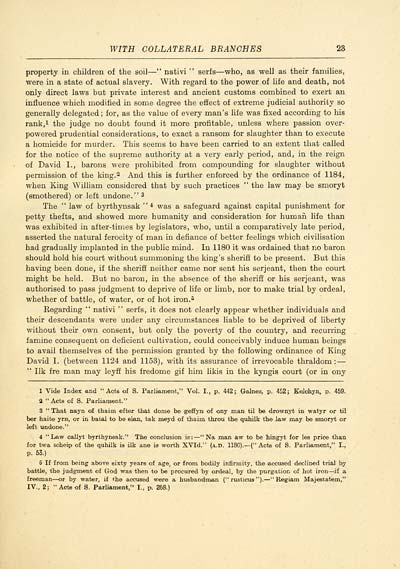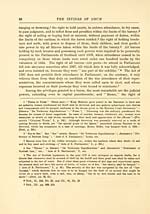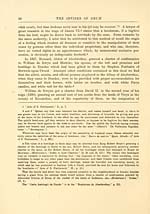Irvines of Drum and collateral branches
(43) Page 23
Download files
Complete book:
Individual page:
Thumbnail gallery: Grid view | List view

WITH COLLATERAL BRANCHES 23
property in children of the soil — " nativi " serfs — who, as well as their families,
were in a state of actual slavery. With regard to the power of life and death, not
only direct laws but private interest and ancient customs combined to exert an
influence which modified in some degree the effect of extreme judicial authority so
generally delegated; for, as the value of every man's life was fixed according to his
rank, 1 the judge no doubt found it more profitable, unless where passion over-
powered prudential considerations, to exact a ransom for slaughter than to execute
a homicide for murder. This seems to have been carried to an extent that called
for the notice of the supreme authority at a very early period, and, in the reign
of David I., barons were prohibited from compounding for slaughter without
permission of the king. 2 And this is further enforced by the ordinance of 1184,
when King William considered that by such practices " the law may be smoryt
(smothered) or left undone." 3
The " law of byrthynsak " i was a safeguard against capital punishment for
petty thefts, and showed more humanity and consideration for human life than
was exhibited in after-times by legislators, who, until a comparatively late period,
asserted the natural ferocity of man in defiance of better feelings which civilisation
had gradually implanted in the public mind. In 1180 it was ordained that no baron
should hold his court without summoning the king's sheriff to be present. But bhis
having been done, if the sheriff neither came nor sent his Serjeant, then the court
might be held. But no baron, in the absence of the sheriff or his Serjeant, was
authorised to pass judgment to deprive of life or limb, nor to make trial by ordeal,
whether of battle, of water, or of hot iron. 5
Regarding " nativi " serfs, it does not clearly appear whether individuals and
their descendants were under any circumstances liable to be deprived of liberty
without their own consent, but only the poverty of the country, and recurring
famine consequent on deficient cultivation, could conceivably induce human beings
to avail themselves of the permission granted by the following ordinance of King
David I. (between 1124 and 1153), with its assurance of irrevocable thraldom: —
" Ilk fre man may leyff his fredome gif him likis in the kyngis court (or in ony
1 Vide Index and "Acts of S. Parliament," Vol. I., p. 442; Gaines, p. 452; Kelchyn, P- 459.
2 " Acts of S. Parliament."
3 " That nayn of thaim efter that dome be gefi'yn of ony man til be drownyt in watyr or til
ber haite yrn, or in batal to be elan, tak meyd of thaim throu the quhilk the law may be smoryt or
left undone."
i "Law callyt byrthynsak." The conclusion is: — "Na man aw to be hinjryt for les price than
for twa scheip of the quhilk is ilk ane is worth XVId." (a.d. 1180). — ("Acts of S. Parliament," I.,
p. 53.)
6 If from being above sixty years of age, or from bodily infirmity, the accused declined trial by
battle, the judgment of God was then to be procured by ordeal, by the purgation of hot iron — if a
freeman — or by water, if the accused were a husbandman (" rusticus "). — " Regiam Majestatem,"
IV., 2; "Acts of S. Parliament," I., p.. 268.)
property in children of the soil — " nativi " serfs — who, as well as their families,
were in a state of actual slavery. With regard to the power of life and death, not
only direct laws but private interest and ancient customs combined to exert an
influence which modified in some degree the effect of extreme judicial authority so
generally delegated; for, as the value of every man's life was fixed according to his
rank, 1 the judge no doubt found it more profitable, unless where passion over-
powered prudential considerations, to exact a ransom for slaughter than to execute
a homicide for murder. This seems to have been carried to an extent that called
for the notice of the supreme authority at a very early period, and, in the reign
of David I., barons were prohibited from compounding for slaughter without
permission of the king. 2 And this is further enforced by the ordinance of 1184,
when King William considered that by such practices " the law may be smoryt
(smothered) or left undone." 3
The " law of byrthynsak " i was a safeguard against capital punishment for
petty thefts, and showed more humanity and consideration for human life than
was exhibited in after-times by legislators, who, until a comparatively late period,
asserted the natural ferocity of man in defiance of better feelings which civilisation
had gradually implanted in the public mind. In 1180 it was ordained that no baron
should hold his court without summoning the king's sheriff to be present. But bhis
having been done, if the sheriff neither came nor sent his Serjeant, then the court
might be held. But no baron, in the absence of the sheriff or his Serjeant, was
authorised to pass judgment to deprive of life or limb, nor to make trial by ordeal,
whether of battle, of water, or of hot iron. 5
Regarding " nativi " serfs, it does not clearly appear whether individuals and
their descendants were under any circumstances liable to be deprived of liberty
without their own consent, but only the poverty of the country, and recurring
famine consequent on deficient cultivation, could conceivably induce human beings
to avail themselves of the permission granted by the following ordinance of King
David I. (between 1124 and 1153), with its assurance of irrevocable thraldom: —
" Ilk fre man may leyff his fredome gif him likis in the kyngis court (or in ony
1 Vide Index and "Acts of S. Parliament," Vol. I., p. 442; Gaines, p. 452; Kelchyn, P- 459.
2 " Acts of S. Parliament."
3 " That nayn of thaim efter that dome be gefi'yn of ony man til be drownyt in watyr or til
ber haite yrn, or in batal to be elan, tak meyd of thaim throu the quhilk the law may be smoryt or
left undone."
i "Law callyt byrthynsak." The conclusion is: — "Na man aw to be hinjryt for les price than
for twa scheip of the quhilk is ilk ane is worth XVId." (a.d. 1180). — ("Acts of S. Parliament," I.,
p. 53.)
6 If from being above sixty years of age, or from bodily infirmity, the accused declined trial by
battle, the judgment of God was then to be procured by ordeal, by the purgation of hot iron — if a
freeman — or by water, if the accused were a husbandman (" rusticus "). — " Regiam Majestatem,"
IV., 2; "Acts of S. Parliament," I., p.. 268.)
Set display mode to:
![]() Universal Viewer |
Universal Viewer | ![]() Mirador |
Large image | Transcription
Mirador |
Large image | Transcription
Images and transcriptions on this page, including medium image downloads, may be used under the Creative Commons Attribution 4.0 International Licence unless otherwise stated. ![]()
| Histories of Scottish families > Irvines of Drum and collateral branches > (43) Page 23 |
|---|
| Permanent URL | https://digital.nls.uk/95635630 |
|---|
| Description | A selection of almost 400 printed items relating to the history of Scottish families, mostly dating from the 19th and early 20th centuries. Includes memoirs, genealogies and clan histories, with a few produced by emigrant families. The earliest family history goes back to AD 916. |
|---|

